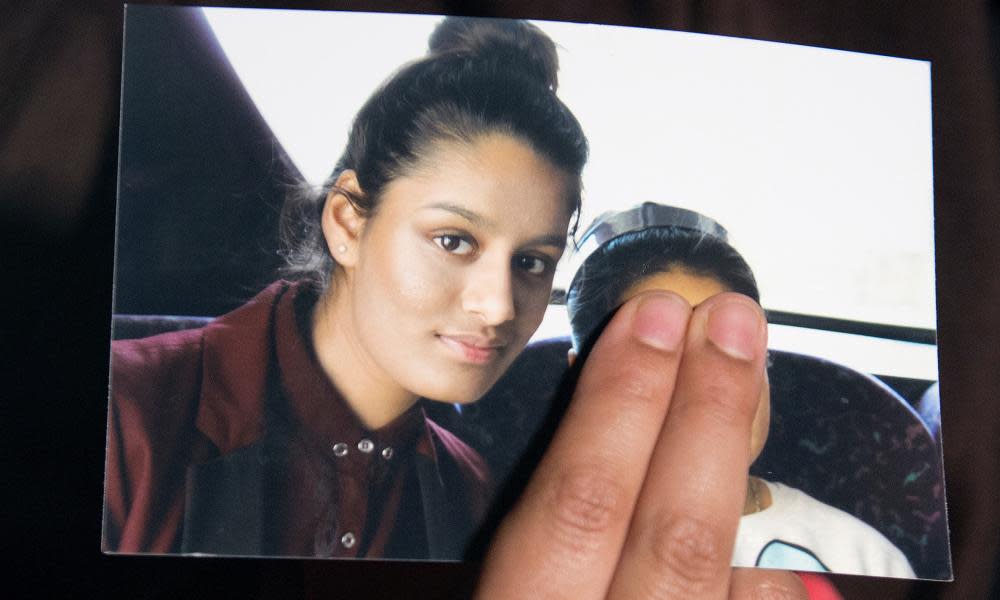How would I deradicalise Shamima Begum? With Islamic scholarship

How do we deradicalise young, indoctrinated people like Shamima Begum? As part of their ideology, takfiri terrorist groups such as Islamic State and al-Qaida justify their aggression towards the west by creating a divide between Muslims and non-Muslims. They argue that the modern nation-state model of governance is incompatible with Islamic principles, and that the Muslim world must be governed by a caliphate based on medieval Sunni Islamic jurisprudence. From her recent interviews, it is clear that Begum is confused and conflicted about these issues: she has clear loyalty to Isis but did also criticise them and called Britain “home”.
The medieval Muslim model of the world has been adapting and evolving for at least 700 years, and modern Islamic jurisprudence accepts that the nation-state system is entirely compatible with Islam.
During my work in 2018, I attempted to help several young radicalised men, including a terrorism convict and a terrorism suspect, to deradicalise and accept and appreciate their British citizenship after seeing how it is supported by Islamic values. My work involved discussing various concepts for them to study.
According to ninth-century Islamic jurisprudence, the world was divided into two – the lands of Islam (dar al-islam) for Muslims, and the lands of disbelief (dar al-kufr) for non-Muslims. Within dar al-kufr, lands were distinguished between lands of war (dar al-harb), and lands of peace-treaty (dar al-sulh).
However, this binary worldview is medieval and no longer a fit for a modern world. While terrorist theologians believe the default state of international relations is based on warfare with the non-Muslim world, modern Islamic international relations are based on peace. Even in the 14th century, the Salafi scholar Ibn Taymiyya issued the Mardin fatwa. Mardin, in modern-day Turkey, was a Muslim-majority town that had been conquered by the pagan Mongols. When asked whether this land – a Muslim population with non-Muslim rulers – constituted dar al-Islam or dar al-kufr, Taymiyya reasoned that it was neither. He introduced the concept of dar murakkab: compound or composite land, of different religions. This fatwa is crucial as it opened the door to Muslims accepting the complex social fabric of our modern, multicultural nation-states.
According to leading 20th-century jurists such as Muhammad Abu Zahra, Wahba al-Zuhayli and Abdullah bin Bayyah, all Muslim-majority countries have subscribed to the United Nations, and according to the Qur’an (5:1) all Muslims are obliged to honour their agreements. All Muslims must therefore honour agreements made to international bodies such as the UN. All modern societies are regarded as belonging to dar al-muwatanah (lands of citizenship).
In my deradicalisation efforts over the past year, a key step was to help those young men understand that, even according to medieval formulations, Britain is not a “land of war” but a land of peace-treaty or covenant, or at least a “compound” or “composite” land of different religions. Some of the young men initially thought that Britain was a “land of war”, with terrorist attacks here being justified by British wars abroad. An important counterargument to this narcissistic view was to ask them to extend it: their logic would justify far-right or neo-Nazi attacks on mosques or Islamic community targets, with the killing of British Muslims being justified in retaliation for Islamist terrorist attacks here. Once they had grasped this, they realised the implications of their logic. Shamima Begum, in a recent BBC interview, used precisely that thought process to justify the Manchester suicide bombing of 2017, and dozens of young British men and women with such views are referred every year to the Prevent programme.
Donald Trump has called for EU nations to take back Isis fighters captured by US-backed forces in Syria. I agree. It is our moral duty, since most of them were radicalised here. The kneejerk reaction of stripping nationality from dual citizens means we would export terrorism abroad. It also has an element of racism, since it is usually applied to British-Pakistanis or British-Bangladeshis, while we never hear calls to strip nationality from British-Americans, British-Europeans or British-Australians when they commit serious crimes. Is this because the latter are seen as “our” criminals, while the former are still seen as foreign or others – and not really British after all?
• Dr Usama Hasan is senior researcher in Islamic studies at the Quilliam Foundation and a part-time imam.

 Yahoo News
Yahoo News 
